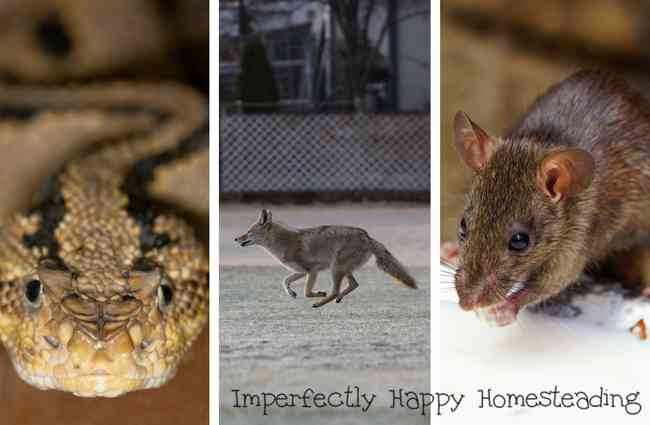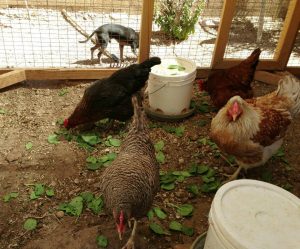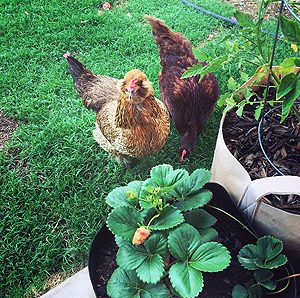Chicken predators are not just a concern for those living on acres in the county. If you have backyard chickens on your urban or suburban homestead then you need to be aware of your chicken predators too!
These are not listed in order of threat – all of the same basic threat potential, depending your your area, your fencing, your coops, etc. Furthermore this isn’t a discussion about us overtaking natural areas for these animals; yes it happens, yes it is sad but that is a discussion for another day. Right now I want you to be aware of the present potential dangers, how to identify them and prevent them.

Top Chicken Predators For Backyard Homesteaders
Top Chicken Predators – Dogs

See my little chihuahua – he loved to antagonize my hens. This early coop had so many issues! That wire alone offered little protection from smaller chicken predators.
Neighborhood dogs can be chicken predators and pose a real threat to your flock. But even more…your own pooch. If you aren’t sure how your dog is going to react to your chickens (yes even little toy breeds), you need to put up a barrier between the two for awhile. My male chihuahua used to be much more aggressive than my big Australian shepherd. Now that he’s almost 13 he can’t be bothered to chase a hen around the yard. A big dog that is able to get into your yard, and not your own dog, will probably carry off its kill.
Top Chicken Predators – Cats
Those sweet little kitties are related to BIG cats and they are predators. And not just feral cats folks; your neighbor’s sweet little kitty could be a potential threat to the life of your girls. Most domestic cats aren’t big enough to carry off a full sized chicken so they’ll do their best to get to the larger/meatier parts of the chicken and leave the rest.
Top Chicken Predators – Raccoons
Raccoons are one of the chicken predators I hear the most about; though not really an issue here in Phoenix. Many urban and suburban areas have raccoons in their backyards often. Raccoons are cute but they can also be pretty vicious. They’ll pull a chicken’s head clean off, right through your wire! They’ll carry off chicks and smaller birds if given the chance but most of the time you’re going to find a headless bird. It is very sad.
Top Chicken Predators – Coyotes
Here in Phoenix coyotes are a real threat to pets that are left outside and to any backyard chicken flock. A coyote can jump as high as 8 feet (most suburban walls and fences stop around 6 feet); and coyotes are good climbers. Coyotes are definitely opportunists – if you make it easy for them to get to your flock they will keep coming back until they’ve eaten them all. Like dogs, coyotes will leave some tell-tale signs like paw prints and feathers; but they usually won’t leave a kill behind unless they got seriously spooked.
Top Chicken Predators – Snakes
Snakes as chicken predators are generally not going to be able to kill and eat a full sized hen or rooster. But they will eat chicks, young birds and they love eggs. They also love heat lamps… I have heard some disturbing stories about homesteaders finding snakes curled up in a nest box, full of an egg or two. After hearing that story I refused to pull eggs before the sun comes up.
Top Chicken Predators – Bobcats
Here in Phoenix I have seen many pictures of sweet faced bobcats sitting on a brick wall in an urban backyard. They are the most common wild cat in the United States so I know Arizona isn’t alone in visits from bobcats. And while the bobcat is not much bigger than your typical house cat, they are more powerful and NOT to be confronted directly! They can and will carry off an entire adult bird with no problem. Your backyard wall is absolutely no protection for your chickens – however a good strong coop will be a deterrent.
Top Chicken Predators – Hawks & Owls
Predatory birds are a real and present danger to your backyard chickens. Hawks are generally daytime hunters while owls hunt at night. Most of the time an owl isn’t going to do much to your birds because by the time they are hunting your chickens should be cooped for the night; but occasionally they get them. Hawks, however, are a much more common threat. They are fast, strong and can pick up a smaller breed or younger bird; though I have heard stories of full sized hens getting attacked and eaten on site.
Top Chicken Predators – Skunks
Skunks are another egg-loving predator. This is generally what they are after when they attack a flock. But they also will kill and eat your birds. If you find you’re missing a lot of eggs and have a scent of skunk in the air it won’t take you long to put that together.
Top Chicken Predators – Opossums
Opossums will maul and maim your birds before killing them. They don’t generally eat an entire adult bird either, however younger birds and chicks are usually eaten entirely. They also like eggs and will eat them on site as well as take one for the road.
Top Chicken Predators – Rats
Didn’t know rats could be more of than a disgusting annoyance? Rats are omnivores and they like chicken coops. Not only will they steal any feed you make available (which is why I have had a Grandpa Feeder for years); but they have been known to eat eggs and chicks as well. I have never heard of a rat eating pullets or adult birds but given the opportunity I’m sure they’d love to. Take precautions to prevent rodents in your coop period – they’re just nasty (see tips for keeping a rodent free coop).
Chicken Predators – Final Thoughts

2 of my girls enjoying the bit of grass we do have in the yard and probably eyeing my strawberry.
First let me say that any and all free-ranging chickens are potential victims. Once a predator has identified your backyard as a buffet, they will return; it isn’t a matter of if they will but when. In my years of raising a backyard chicken flock I have not lost a chicken to a predator, even when free-ranging. I credit some of this to the fact that my yard is FILLED with raised bed garden boxes and predators don’t like tight spaces. Additionally I know I owe some to my Australian Shepherd who goes in and out all day and night to check on her girls. But even with boxes and/or a larger dog, there is no guarantees and you need to know that going in. Free ranging is wonderful but it is not without its perils.
Your best protection from all predators is a good solid coop with hardware cloth instead of chicken wire. You may want to consider putting wire under the coop and sides past the frame to keep predators from digging under. A roof will be a necessity too because most of these chicken predators can jump and jump high. It is also important to keep an eye on your flock if you do free range them. Consider cooping them when you aren’t at home; so even if a predator gets one they might not get more if you catch them.
Research the native animals in your area so you can best prepare for them. Like I said, though, once they find your flock is available for eating they will be back until there is nothing to eat. Chicken predators in urban and suburban areas are usually animals that have had their hunting area limited by people and they are going to eat by any means possible.





